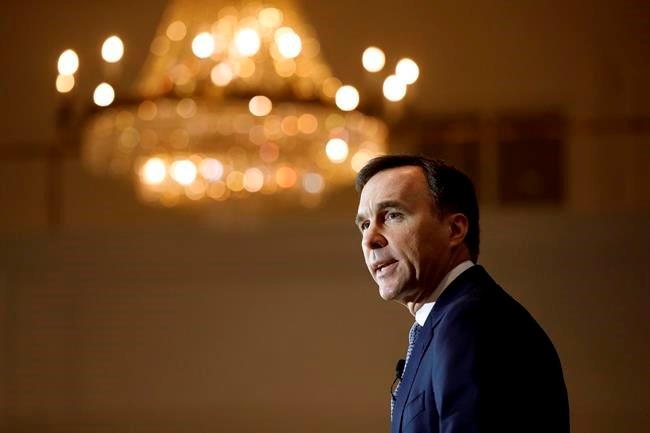OTTAWA — Finance Minister Bill Morneau sought to ease the concerns over the novel coronavirus outbreak on a day where financial markets dropped along with the price of oil, and the Liberals said they were preparing help for a worst-case economic scenario.
Morneau only said the government was "looking at taking some initiatives this week" to help affected workers and families, ensure businesses make it through financial challenges, and keep Canada's health-care system healthy.
He stressed the economy and federal finances can weather the storm from COVID-19 and a sudden plunge in oil prices.
Morneau suggested any federal stimulus spending won't be tied to the budget, for which he did not provide a date.
"We need to be thinking about how we respond to events appropriately and that will not necessarily be just about the budget," Morneau said after markets closed Monday.
"There are sectors of our economy that are going to go through real challenges because of the changes right now ... and we'll be looking at how we can make sure that we are appropriately dealing with those challenges."
The federal government can increase spending by an estimated $41 billion and keep the debt-to-GDP ratio declining, the parliamentary budget officer said in a report last month. BMO Economics said in a note that "Canada's healthy federal balance sheet will be useful" with pressure to increase spending.
Then over the weekend came an oil price war between Saudi Arabia and Russia that lowered the price of crude below federal budget projections.
Federally, the parliamentary budget officer has previously estimated a US$15 decline in crude prices would shave $4 billion off the budget for the fiscal year beginning April 1.
The Liberal government's economic update from late last year projected the price of West Texas Intermediate at US$57 a barrel for this calendar year. On Monday, it ended trading around US$31, a difference of US$16.
As prices dropped, TD Economics said in a research note that the outlooks for Alberta, Saskatchewan and Newfoundland and Labrador were likely to be "downgraded significantly" for the year.
"Days like today are not easy," said Natural Resources Minister Seamus O'Regan of the impact to provincial budgets, adding: "This is of great concern."
Even more bleak was a report from the United Nations Conference on Trade and Development that warned the COVID-19 should "will trigger a recession in some countries" and decelerate growth globally.
Deputy Prime Minister Chrystia Freeland said in question period the government was "planning for worst-case scenarios."
How the government responds should be assessed by whether the measures are temporary, timely, and targeted, said Mostafa Askari, chief economist at the Institute of Fiscal Studies and Democracy — a think tank run by former parliamentary budget officer Kevin Page.
Business and labour groups have urged the government to ease access to employment insurance sick leave benefits, which the government appears open to doing, along with tax credits and other breaks as part of the federal response.
Waiving the waiting period to receive EI payments would help workers who find themselves suddenly under quarantine, or encourage them to self-isolate to contain the spread of the disease, said Dan Kelly, president of the Canadian Federation of Independent Business.
Likewise, reducing the number of hours necessary to qualify for payments would provide benefits to low-income workers who can't afford to take time off for illness, said Hassan Yussuff, president of the Canadian Labour Congress.
"You're going to have to find a way to help them get some income because in absence of that, they are going to go to work because they don't know what else to do. They need the money to pay their bills."
He added that his group has asked the government to consider having banks and credit card companies relax payment schedules for those whose earnings are affected by COVID-19.
NDP Leader Jagmeet Singh said the government needs to make sure affected workers who don't qualify for EI can also benefit for financial help.
Trevin Stratton, chief economist at the Canadian Chamber of Commerce, said any tax credits and tax-filing extensions for affected businesses could help companies weather the economic storm by giving them short-term cash flow help.
This report by The Canadian Press was first published March 9, 2020.
Jordan Press, The Canadian Press

